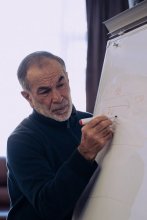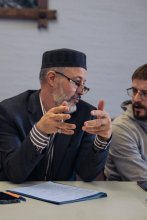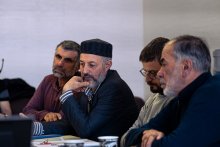


From January 15 to 20, the Institute for Bible Translation held a practical seminar on oral Bible translation (OBT) in Makhachkala.
Translators and exegetical advisers from the Tsudakhar, Godoberi, Chamalal and Karata projects participated in this event. All four of these non-written languages belong to the Nakh-Dagestani language family. The oral nature of the use of these languages by their speakers determined the choice of the oral Bible translation methodology for them.
The workshop started with an introduction to the methodology of the translation process, providing the participants with a solid foundation for their practical exercises. The practical segment of the workshop focused on the 1st chapter of the book of Ruth, allowing the participants to apply the newly acquired knowledge and skills to a specific biblical text.
In oral translation methodology, particular emphasis is placed on the process of internalisation, which entails immersing oneself deeply in the text for the purpose of comprehending its narrative. This stage involves a collective discussion of the book's plot, characters, and their emotional states.
As the entire translation process is done orally, the translation team members can use various visual exercises to memorise long sequences of events, such as creating a series of sketches, dramatising the storyline, or setting up so-called "memory palaces" using random objects. All these exercises ultimately make the translation more natural and easy to understand.
At the end of the seminar, the first chapter of the Book of Ruth was translated in all four languages and an audio recording of the first drafts of the translation was made using a special computer programme called Render, for further verification by exegetical editors.
The seminar participants also visited the village of Kuppa, where they were warmly welcomed by the locals, got acquainted with the exposition of the Kuppa Museum of Paleontology, Archaeology and Local History, as well as with the activities of the Tsudakhar Centre for the preservation and development of the Tsudakhar language. The head of the museum presented a book about the history of the village and its inhabitants to the Institute for Bible Translation.

Share: